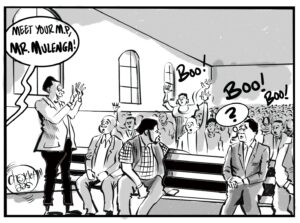Local Government Minister Vincent Mwale says it is not government’s duty to pay council workers’ salaries.
And Mwale says government is in the process of rolling out the electronic system of collecting revenue in markets and bus stations in order to get rid of cadres as well as increase revenues for councils.
In an interview, Mwale explained that it was the responsibility of councils to find ways and means of paying their workers’ salaries.
“The long-term solution lies in councils finding means and ways of raising their revenue to be able to meet their own budgets. The monies we are giving them is not salaries’ money, it is not salaries’ grant. A salary doesn’t come from government, it comes from themselves, but there is a grant, which we give them to help them meet their obligations [and] it is known as Local Government Equalization Fund. Except that councils that cannot raise money solely depend on this [grant] for salaries. That is how the confusion comes in of saying government has delayed to release salaries. It is not salaries that we give them, [but] it is help [since] they are a grant-aided institution just like other grant-aided institutions that we have in agriculture, in some colleges, universities and so on. And so all councils receive some help on a monthly basis, but that is not [for] salaries no,” Mwale said.
He said councils should find their own money to meet their obligations than solely depending on the Equalization Fund.
“Whether they use [that grant] on salaries or not that is really up to them. So, some depend solely on it for salaries [whereas] some don’t depend on it, they find their own money to pay their own salaries and so on. So, that is one thing I want to clarify and councils know this, even unions know this very well; [and] they will tell you that what we give them is not salaries’ money, but just a grant to help them. In fact, they turn it to become salaries’ money because they can’t find monies elsewhere,” he explained.
Mwale said as a way of helping councils raise funds, government had passed a Ratings Bill to allow councils collect rates even from properties that were not yet on title.
“What are we doing to make sure that councils find money that can enable them meet their obligations? We just passed the Rating Act in Parliament in December. This Rating Act is now going to broaden their revenue base. You see, currently, [it’s] only those who have title pay rates. Those that don’t have title, even though they own land and they are building and they have got houses, [but] because they have no title, they are not paying rates [and so] we have changed the law to include those. If I have a house myself [and] in fact I can tell you [that] I have a house in Chipata, a big house [which] I built a long time ago; [but] I haven’t yet obtained title for that house. I am not paying rates just because I have no title. My neighbour has title [and] he even has a smaller than mine but he is paying rates just because he has got title,” Mwale said.
“So, we [have been] punishing those that have got title and leaving out those that do not have title. But this law will enable councils to collect money even from me for as long as that land was offered to me legally, as long as it was offered to me on an offer letter. If I don’t want to obtain title so that I run away from paying rates, it won’t happen now because the law has changed, and once this law takes effect, most councils, for example, Chongwe where you have more than 35,000 properties and only about 7,000 are paying rates because they are the only ones with title. Things will change, Chongwe will see a lot more money coming to them.”
Mwale, who is also Chipangali PF member of parliament, revealed that increased revenues had been realised following the introduction of electronic payment systems for market levies.
“The other thing is that you have seen that we have started collecting market levy, for example at BH market using electronic means. I can tell you that BH market now is one market, which provides more money to the council than any other market in Lusaka even though it hasn’t got more traders compared to other markets, but in terms of efficiency in the collection of fees, it is giving more money than any other market because they are using electoral means of collecting money,” he disclosed.
Mwale said his Ministry is in the process of rolling out the electronic payment system to all market and bus stations around the country.
“We want to see more of this in Lusaka, in Ndola and in the entire country. So, we want to roll this to all the markets; we want to make sure that we collect money from markets, from bus stations electronically and this will improve revenue for the councils. It will get rid of all those individuals who impose themselves whether they are cadres or just powerful people in the communities. All of them will not be part of the system because the marketer will just pay electronically and money just goes straight into the account of the council. And if this happens, councils will have a lot more money that they will not have to depend on the grants,” said Mwale.
“And I must say that Equalization Fund over the last three years has been increasing. In 2016 it was K960 million if am not mistaken, then in 2018, it increased to about K1.1 billion and now it has increased to about K1.2 billion. So, you divide that by the number of councils that we have, but not all councils are getting the same amount. It’s Equalization, we have to equalize [as] some councils are more capable [of raising their own resources] and others are not.”























